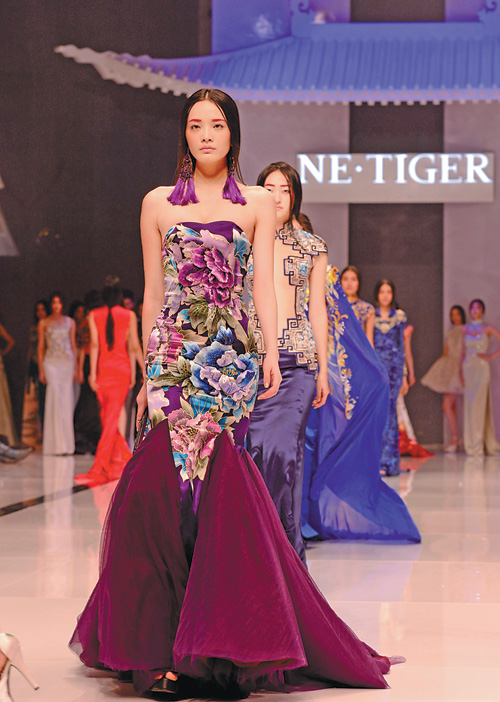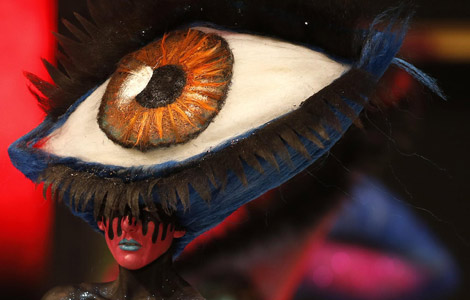Luxury fashion labels measure up to the competition
Updated: 2013-05-10 07:27
By Wang Zhuoqiong and Wang Wen (China Daily)
|
|||||||||||
|
Models present its high-end made-to-measure dresses at NE Tiger's fashion show. The Chinese luxury fashion brand's annual output of made-to-measure luxury dresses hovers around the 2,000 mark. Provided to China Daily |
Chinese luxury fashion brand NE Tiger recently sent three designers to Riyadh to make clothing for a member of Saudi Arabia's royal family.
The princess selected a blue dress with golden dragon embroidery that she saw at an exhibition in Riyadh in April.
All of NE Tiger's luxury dresses are made-to-measure, and usually take one to two months to complete.
But the domestic luxury dress manufacturer, which was established more than two decades ago, has only been in the black for the past five years, said Zhang Zhifeng, chairman of NE Tiger Fashion Company.
In order to transform itself from a giant in manufacturing and exporting clothes to a well-known domestic high-end designer brand, Zhang said he had to invest the profits gained from subcontracting into self-designed products.
His company exports about 20,000 fur items and garments annually to overseas department stores and other brands. "The company remains engaged in subcontracting, although this is becoming a smaller proportion of our business," Zhang said.
He said that the company's urgent task is to boost domestic demand for its made-to-measure luxury clothing brand.
At the moment, NE Tiger's annual output of made-to-measure luxury dresses hovers around the 2,000 mark.
NE Tiger is also working on building a garment department to manufacture daily wear, such as business suits.
Despite costing at least 30,000 yuan ($4,760) per item, NE Tiger's luxury clothing business operates on a narrow profit margin since various traditional Chinese tailoring technologies are used.
"We need a higher production rate to support the business," Zhang said.
Some other Chinese fashion brands consider the high-end market a mountain that is too hard to climb, while NE Tiger is already there and is hunting for more customers.
Like NE Tiger, the nation's other high-end made-to-measure fashion brands have struggled with fierce competition from their international peers, as many Chinese customers have developed a taste for foreign luxury brands.
But the nation's fashion business was boosted overnight when China's first lady Peng Liyuan made her diplomatic debut wearing clothing tailored by domestic fashion designers, sparking discussions about the rise of local fashion brands.
"The image of the first lady wearing a Chinese fashion brand showcased our capabilities to the rest of the world," said Zhang.
He said the move also strengthened consumers' faith and confidence when choosing between domestic and international brands.
The capital market also showed its approval of China's fashion industry, with some fashion manufacturers' stocks rising for several days running in March.
Zhang Qinghui, deputy director of China National Garment Association, said high-end customers in first-tier cities such as Beijing and Shanghai have a growing demand for the personal touch, boosting the growth of the high-end clothing industry.
The massive domestic market has presented many traditional export-oriented manufacturers with opportunities during the global economic slowdown.
Hu Dongmei, secretary of the board of Dalian Dayang Trands Co Ltd, a leading garment manufacturer and exporter in China, said the domestic high-end suit market is massive for her company, and is considered a major growth engine.
Though the consumption habits and culture in terms of suits are not as mature as in Western markets, local consumers' desire to boost their personal image has explained the potential to grow quickly, she said.
The high-end bespoke clothing sector has increased rapidly, with its revenue doubling every year, said Hu.
One of Trands' advantages in high-end bespoke clothing is its manufacturing capacity. "Unlike companies that only have designs but no factories, we can proceed very quickly from designing to manufacturing."
Hu said the market share of domestic brands and high-end bespoke clothing has increased in recent years, with the ratio between its domestic and export business is set to reach 50:50 in the near future.
In 2012, Trands' revenue reached 856.1 million yuan, down 11.17 percent year-on-year. Its net profit decreased 28 percent to 105.21 million yuan. In China, the company added eight stores last year, with improvement in single store operational revenue.
The decline in its business was due to international market woes, price competition from Southeast Asia and domestic suit market integration. Its export orders and the domestic suit market have also seen declines, according to the company.
The main challenge for Dalian Dayang to extend its manufacturing based business to branding and marketing operations is to raise the quality of its products and know what local customers want, according to Hu.
The company has set up three designer teams for each of its three brands, with its high-end brand Trands inviting leading designers from Italy.
"The designs have to be ahead of the trends," Hu said.
However, it will take a long time for local fashion brands to build up their high-end identity among Chinese consumers, some business insiders say.
"How to change Chinese high-end consumers' preference for foreign brands is a challenge for local brands," said Shen Dongri, chairman of Lancy Company Limited, the only women's clothing manufacturer listed in the A-share market.
Design is also an issue, with many companies finding that their growth is hampered by shortcomings in this respect.
Many Chinese fashion brands developed from being manufactuerers producing goods for other people, but their Archilles' heel has always been their design capability.
"Chinese fashion brands know manufacturing," said Shen. " But their design capabilities are still too limited, although we try to integrate Chinese culture into the design."
Chinese brands cannot express Chinese culture correctly now, he added.
Wang Yutao, who owns a fashion design studio, which has provided couture designs since 2007, said high-quality clothing is a mixture of expensive fabric, delicate handcraft and the ability to meet customers' requests.
Today's Top News
Cross-border shopping exodus expected
Manila to apologize for fisherman's death
Sex slave comments anger China
Mystery package prompts consulate closure
Environment vital: white paper
President makes surprise visit to job fair
Measures promised to tackle refinery waste
Migrants need psychological aid
Hot Topics
Lunar probe , China growth forecasts, Emission rules get tougher, China seen through 'colored lens', International board,
Editor's Picks

|

|
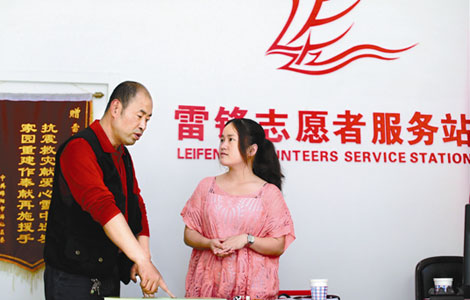
|

|
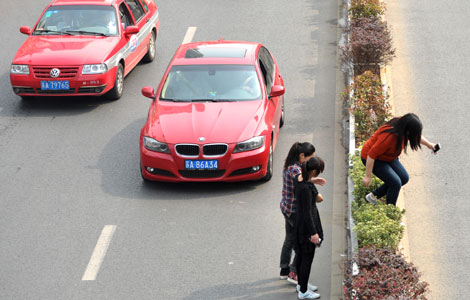
|
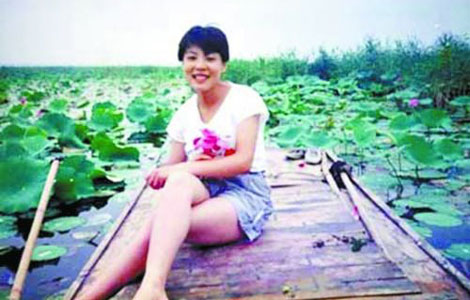
|
